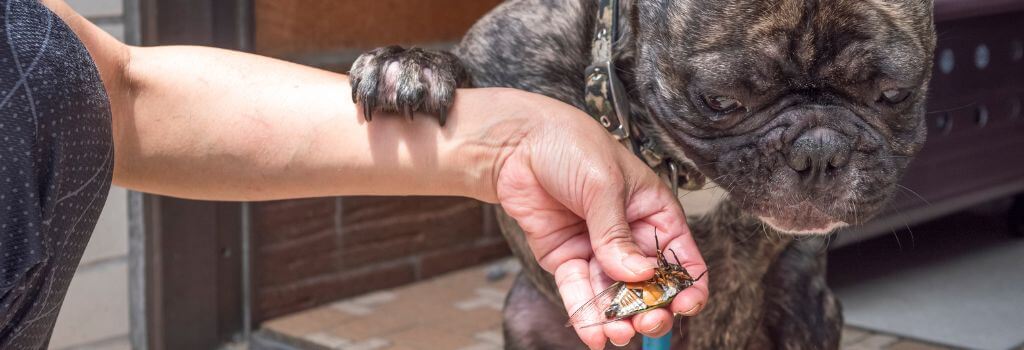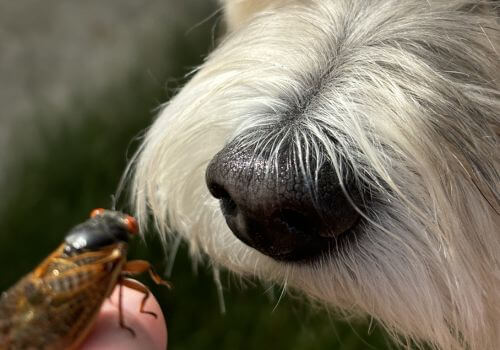It’s an unavoidable fact of pet ownership that at some point in time, your dog is going to eat something they shouldn’t. Whether it's a grape that fell off the counter, a toxic plant on the table, or some questionable item they scooped off the sidewalk before you could react, there will come a moment when you're searching online or calling your vet to ask, “Can my dog eat that?”
Every season brings something new for your dog to sniff and explore, and in the summer, that often includes the cicadas scattered across the ground in some regions. One question we hear a lot from pet owners during this time of year is: Is it okay for my dog to eat cicadas? While most people in the Midwest and southern United States are already all too familiar with these large and loud insects and their signature summer buzzing, they’ve not stopped to really think about whether or not these bugs pose any threats to their dogs.
In this blog, I’ll be answering the most common questions I’m asked about dogs and cicadas and explain why these insects can cause more problems than most pet owners think.
Why Does My Dog Eat Cicadas?
Like many other bugs and creepy crawlies, cicadas can be very enticing to dogs. They can be not only fun to hunt and chase, but also eat, as some dogs enjoy the crunchy texture of bugs that have a harder exoskeleton. For many dogs, they’re the perfect combination of fun toy and tasty treat – even if we think that’s pretty gross.

For dogs that love to hunt or play with small animals or insects outside, one of the most appealing features of a cicada is their movement. These large insects are hard to miss and get around by flying, slowly crawling, or tunneling through the ground, making them easy prey for almost any dog. Some dogs may be so interested in cicadas that they dig them out of the ground or will spend a while tossing them around the yard if you let them.
Even if your dog isn’t the most observant while outside, cicadas can still be challenging to miss and might pique their interest. Cicadas are most well-known for the loud buzzing or clicking sounds that they make, and dogs, with their great sense of hearing, can often hear them underground before they have even emerged from the ground for the season, and this becomes a fun investigation for your dog.
Once dogs realize how fun it is to chase and eat cicadas, it can be hard to get them to stop!
Are Cicadas Poisonous to Dogs?
If your dog just can’t seem to keep their paws – or mouth – away from cicadas, there’s some good news: Playing with cicadas is not harmful. These insects don’t sting or bite, so your dog isn’t at risk when they’re batting them around the yard. But that doesn’t mean they are completely harmless. Potential issues start to become a reality when dogs ingest the cicadas.
Cicadas are not toxic to eat, so many dogs can play with them to their heart’s content without having problems. But for dogs that like to eat the cicadas once they’re done hunting them, cicadas can cause varying degrees of gastrointestinal upset. This occurs because cicadas have a very tough exoskeleton that does not dissolve easily, even in a dog’s stomach. When passing through a dog’s digestive tract, the undissolved exoskeletons can cause local irritation or even obstruction if enough shells are eaten and can’t pass.
When it comes to symptoms, a dog eating cicadas can cause gastroenteritis, GI pain, vomiting, and diarrhea, so while these insects aren’t directly toxic, they can still wreak havoc on your dog’s stomach and create several undesirable side effects.
My Dog Ate a Cicada, What Do I Do?
If your dog has already eaten one or more cicadas, the best course of action is to monitor them for signs of gastrointestinal upset. If you notice any of the following, let your veterinarian know right away:
- Vomiting
- Diarrhea
- Inappetance
- Lethargy
- Localized pain in the abdominal area
The amount of gastrointestinal upset that a dog will experience after eating cicadas may vary from dog to dog and can also depend on the number of cicadas eaten. For example, eating one cicada is unlikely to cause any noticeable issues for a healthy dog, beyond some mild discomfort. However, eating multiple cicadas can have severe consequences, including abdominal pain, bloody diarrhea, and other symptoms. A little diarrhea or mild stomach upset can be managed at home, but more severe reactions will need intervention from a veterinarian, so if you know your dog got hold of a cicada, be sure to keep a close eye on them over the next few hours.
There’s no telling how your dog will react to a cicada’s exoskeleton, so the best thing you, as an owner, can do is prevent them from eating any cicadas in the first place.
How to Minimize the Risk of a Dog Eating Cicadas
Stopping your dog from eating things off the ground is often easier said than done, but in the case of dogs eating cicadas, a little extra effort in prevention is worth it for your dog not to suffer from a cicada-induced stomach ache.

Owners who trained their dogs to follow the “leave it” command will have the easiest time keeping their dog from eating too many cicadas, but even for untrained dogs, there are still a number of viable options for keeping your dog from getting sick from taste testing cicadas.
If your dog is obsessed with cicadas and can't resist eating them every chance they get, consider keeping them on a leash for walks or time in the yard, so you can have more control over them picking up or eating the cicadas. With a leash, you'll be able to steer your dog away from any noticeable congregations of cicadas on the ground or, at the very least, be able to get a cicada out of their mouth much quicker.
If you prefer not to have a leash on your dog during walks or while they’re exploring the yard, redirection with a treat may be a helpful alternative. Once your dog has a cicada in its mouth, offer them a high-value treat in exchange for dropping the cicada or letting you remove it from their mouth. If cicadas are common in your area, be sure to keep some treats on hand whenever your dog is outside with access to cicadas!
If you have questions and you'd like to reach out to us, you can call us directly at (941) 253-5218, or you can email us at staff@uacvet.com. Don't forget to follow us on social media Facebook, Instagram.
